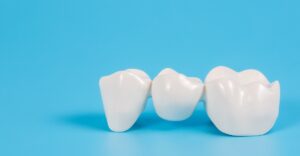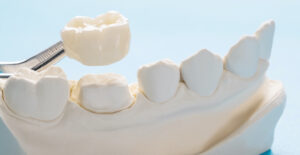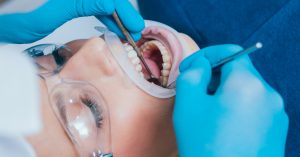If you have ever woken up with a sour taste in your mouth or experienced bad breath throughout the day, you are not alone. Bad breath is a common condition also known as halitosis. It is estimated that 25 to 50% of Americans struggle with bad breath, which can leave them with a drop in self-confidence and concern for oral health. Most of the time, causes for bad breath are benign and are not a reason for concern, but occasionally there is a root cause of halitosis that should be addressed by your dentist.
Below you will learn how halitosis can be identified and how you can find the cause and possible solution for this pesky condition. Many times, bad breath can be simply overcome with some simple oral health care tips!
Research shows that nearly all cases of bad breath are caused by poor oral hygiene, bacteria left on the tongue, or poorly kept dentures. Most of the time, bad breath is an embarrassing condition, but is caused by a reversible habit. The most common causes of bad breath are:
- Foods – Foods that have a foul odor like onion and garlic can cause bad breath, especially if they are left around your teeth for long periods of time.
- Tobacco products – Smoking cigarettes and nicotine products are one of the leading causes of bad breath and are one of the number one causes of gum disease.
- Poor oral hygiene – People who don’t brush or floss regularly are more likely to have periodontal problems, resulting in halitosis. Your tongue can also trap bacteria that causes a sulfur odor.
- Medications – There are medications that cause people to have a dry mouth, which often results in bad breath.
The best way to help reduce the chances for bad breath is to keep up with your oral hygiene using an ADA approved fluoride toothpaste twice each day. You should also floss and drink water regularly to help decrease the amount of sulfur releasing bacteria in the mouth. If using toothpastes and rinses don’t help, it is important to consider other reasons why you have halitosis.
There are instances where bad breath is caused by a more serious condition and should be addressed by your medical and/or dental professional. Other main causes of bad breath include:
- Periodontal disease — Gum disease is the most common cause of bad breath. It occurs when plaque and tartar build up on teeth and gums, resulting in a buildup of bacteria in the mouth and bone loss.
- Diabetes — Diabetes may also lead to altered breath as a result of ketones present in the urine due to uncontrolled blood sugar levels.
- Gastrointestinal problems — Issues such as gastroesophageal reflux disease (GERD) can cause halitosis.
- Infections and respiratory tract conditions — Respiratory tract conditions such as pneumonia, bronchitis, and sinusitis, are possible causes of bad breath.
What are the symptoms of bad breath?
Bad breath can be identified by the person themselves or others around them, but the best person to help identify halitosis is your dental professional. Speak with your dentist or hygienist at your next dental visit to discuss your concerns. They will let you know based on your medical and dental histories, and a clinical exam if you have halitosis and how you can correct it.
Some people tend to be mouth breathers and notice they have bad breath because they sleep with their mouths open or snore at night. You should make a list of your symptoms and any specific times you notice halitosis is more severe throughout the day.
Treatment of Bad Breath
There are many ways you can overcome bad breath if it is caused by poor oral hygiene habits or foods. Some easy recommended treatments for bad breath are listed below:
Here are some common remedies to try:
1. Improve your oral hygiene
You should always practice good oral hygiene habits by brushing your teeth at least twice a day with a fluoridated toothpaste and a soft-bristled toothbrush. You can also use an alcohol-free mouthwash or rinse every time you brush your teeth. This helps kill germs that might cause gum disease, tooth decay, and bad breath.
Flossing is an important part of your oral hygiene regimen because bacteria often gets trapped between teeth or under your gums that can’t be removed by brushing. Flossing helps remove food and plaque debris from in between the teeth that can lead to bad breath and other dental problems.
2. Drink more water
Another common cause of bad breath is dry mouth (xerostomia), which is often the result of not drinking enough water or a side effect of certain medications. Drinking water also helps flush food debris left behind to reduce your chances of developing cavities.
3. Gargle with salt water
Gargle with salt water to help fight bad breath. Add a teaspoon of salt to a glass of warm water and gargle with it for as long as possible. This can get rid of bacteria from your mouth and fight bad breath because salt water is anti-bacterial.
4. Brush your tongue
The tongue is a main culprit of bad breath. It can trap food particles, bacteria, and dead cells that can cause bad breath. You can use a tongue scraper to remove this debris and stimulate blood flow to the tongue, but it should be done daily to help reduce trapped odors.
5. Eat healthy foods
Eat and drink foods that will help freshen your breath and reduce the bacteria that cause bad breath like green tea, apple cider mouthwash, and apples. It also helps reduce plaque and tartar build-up on teeth.
6. Quit smoking
Smoking cigarettes or chewing tobacco products can lead to a number of health problems, such as lung cancer, tooth decay, gum disease, and tooth loss. It is also responsible for bad breath, which is why quitting or avoiding smoking altogether is always recommended.
7. Correct mouth breathing
If you are a mouth breather at night, it can be corrected with myofunctional therapy or appliances that help you prevent snoring like a mouthguard. Mouth breathing throughout the day also results in a dry mouth that can contribute to bad breath.
8. Clean your dentures
If you have dentures, always remove them at night and thoroughly clean your dentures before putting them back in your mouth. If you wear dentures and have bad breath despite cleaning them daily, speak to your dental professional about having them cleaned or replaced.
Bad breath can be embarrassing, but with a lot of research into your daily habits and improving your oral health, it can usually be corrected. Consider questions like whether you are taking any medications and how often you floss so you can be prepared to speak with your dentist about any bad breath. Oftentimes, brushing and flossing each day while drinking more water will help reverse any bad breath and improve your oral health and confidence. Please contact us today if you have any questions. We can help!












